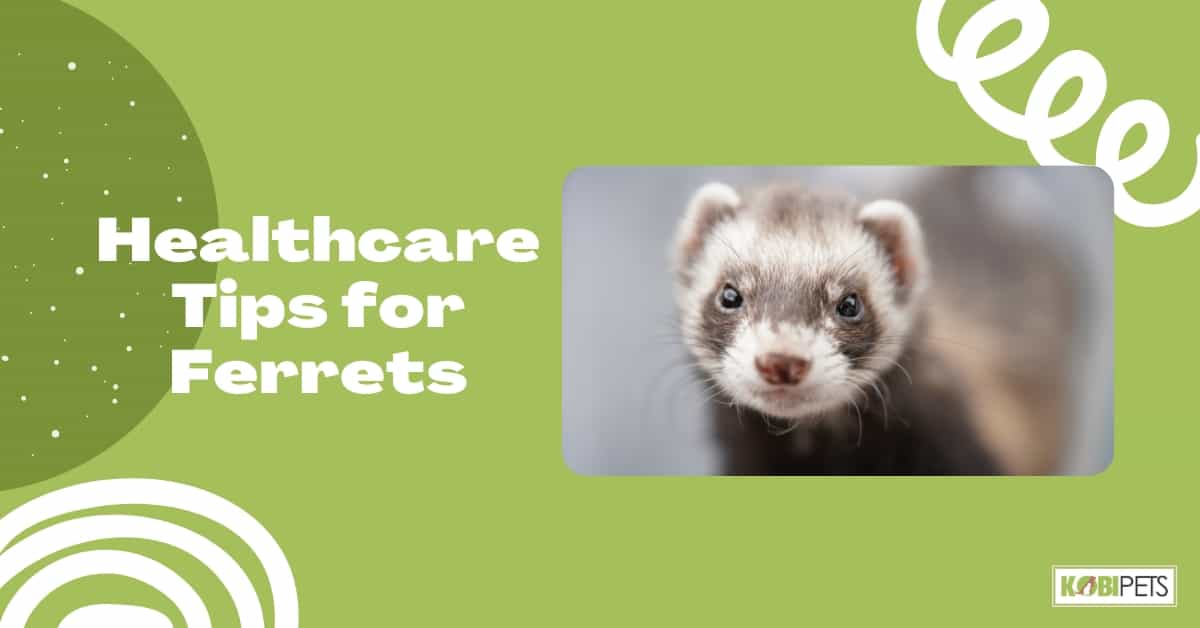
Are you the proud owner of a ferret? If so, you know that keeping your furry friend healthy is important. Ferrets are notoriously curious and active creatures and require special care to stay in tip-top shape.
Ferrets need regular check-ups, vaccinations, a diet high in protein and fat, and plenty of exercises. They also require a clean living space, dental care, grooming, and monitoring for illness to maintain their health and prevent serious health problems
We’ll provide information on diet, exercise, veterinary care, and more to help ensure that your ferret is healthy and happy. So read on for everything you need to know about ferret healthcare!
Diet for Ferrets
Ferrets are wonderful, playful animals and the perfect pet for many households. They have a special diet that needs to be followed to keep them healthy and happy.
The first step in properly feeding your ferret is to ensure you always have high-quality ferret food on hand. Look for food specifically designed for ferrets, which will include plenty of proteins and fats, vitamins, minerals, and amino acids needed for their health. You may also add fresh fruits and vegetables such as apples, broccoli, or carrots as occasional treats.
It’s important to avoid foods high in sugar or carbohydrates as these are not naturally found in the diet of wild ferrets. Foods like bread, rice, and popcorn should never be given to ferrets. Also, make sure not to feed your ferret any artificial sweeteners (such as Xylitol).
Here is a list of some safe foods for ferrets:
- High-quality Ferret Food
- Fresh Fruits (especially Bananas)
- Learn Raw Meats & Fish
- Vegetables (like Carrots or Broccoli)
- Hard Boiled Eggs
- Unsweetened Yogurt
When it comes to water, make sure it’s clean, fresh water that is changed regularly and served in a bowl that is large enough for them to submerge their entire face into when drinking. If you suspect your pet may have dietary issues due to an illness or age, consult with your veterinarian before making changes to their diet.
Finally, remember that although diet plays an important role in keeping your pet happy and healthy it’s just one part of good care; make sure they receive regular exercise and mental stimulation too!
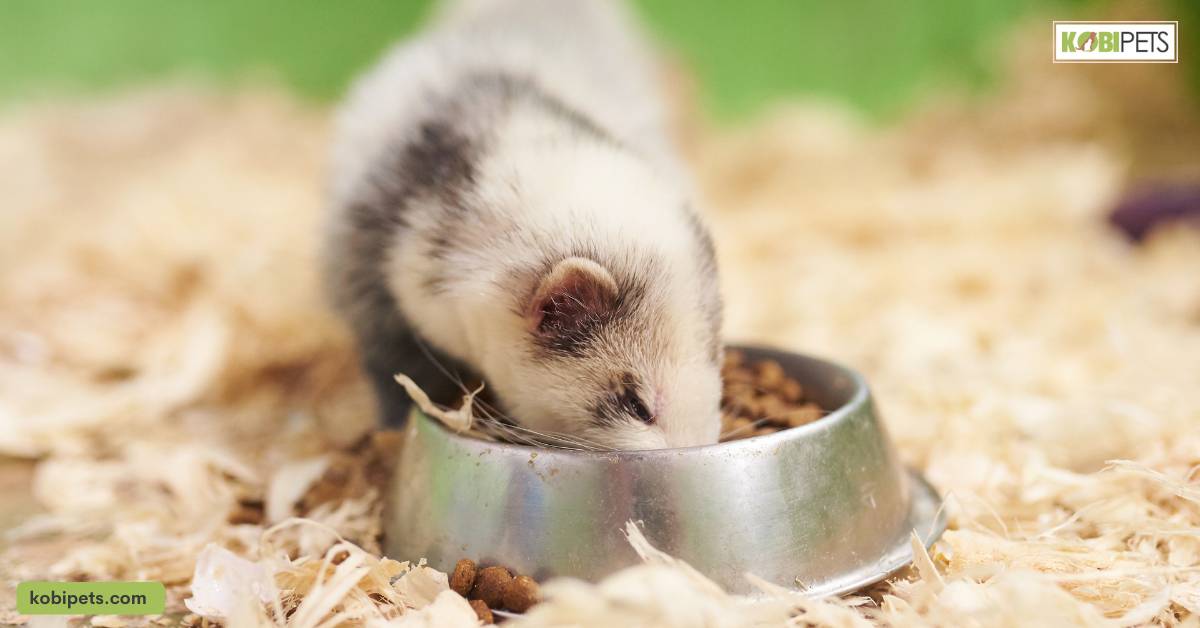
Exercise for Ferrets
Ferrets are active and inquisitive creatures that require regular exercise to stay healthy and happy. Here are some great ideas for how to incorporate physical activity into your ferret’s daily life:
- Provide your ferret with plenty of playtimes, either supervised or unsupervised. This will keep them from getting bored and destructive!
- Allow your ferret to explore a variety of different places inside the home such as under furniture, between cushions, and in other nooks and crannies. A good rule of thumb is to introduce a new area each day so they have something new to investigate.
- Make or purchase a few basic toys that your ferret can use when playing alone. Cardboard boxes filled with shredded paper, tunnels made of fabric tubes, wooden bridges, or even homemade squeaky toys all make great interactive activities!
- Construct an obstacle course in which the ferret can climb over small steps, weave through hoops or go down slides – all while being safely monitored by you. Keep it fun and challenging by switching things up occasionally so they don’t get bored!
- Finally, if possible take your pet outside for a bit of fresh air on nice days. Secure outdoor enclosures or enclosed balconies can make great playgrounds for ferrets (with the supervision of course!) where they can explore their natural environment safely.
Providing regular exercise opportunities is an essential part of caring for your beloved pet ferret; not only will it help improve their quality of life but also prevent boredom-induced behavioral issues further down the road!
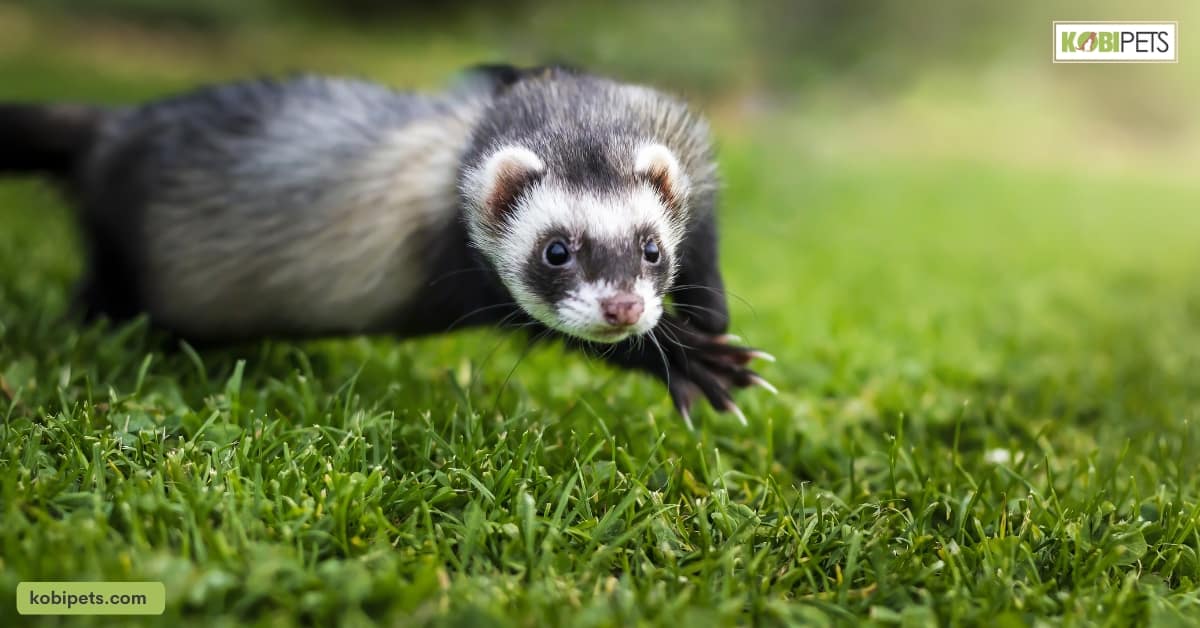
Veterinary Care for Ferrets
Ferrets are becoming increasingly popular pets due to their playful, curious, and sociable natures. However, looking after a ferret comes with its own unique set of responsibilities, particularly when it comes to veterinary care.
Regular check-up
Providing routine health check-ups is crucial for the overall well-being of your ferret. An annual physical examination by a qualified veterinarian will help detect any underlying conditions that may be causing discomfort or distress. This includes checking his/her eyes, ears, and nose as well as taking a complete history of your pet’s diet, lifestyle, and environment to identify potential risks.
Vaccines
Vaccines are another important part of caring for your ferret’s health. Depending on where you live, there will be certain vaccinations required by law to keep your pet healthy and safe. Vaccines recommended for ferrets include Canine Distemper Virus (CDV) and Rabies virus (RAB). An additional vaccine against Coronavirus is also available but not always necessary depending on the individual situation.
Proper nutrition
Proper nutrition is paramount for keeping your pet strong and healthy throughout his/her life. Good quality kibbles designed specifically for ferrets can provide all of the essential nutrients he/she needs day to day. Supplements may also be advised as needed depending on the individual circumstances. Additionally, fresh vegetables such as carrots or lettuce can make great treats but should not replace regular meals.
Dental care
Finally, dental care should not be overlooked since it can significantly improve your ferret’s quality of life and even extend its lifespan! Dental checkups should be done annually or bi-annually depending on how quickly tartar builds up in the mouth of your pet – so make sure you are aware! Regular brushing with a soft toothbrush is also advisable if possible. Providing adequate veterinary care throughout the lifetime of your ferret is an important step in keeping him/her healthy and happy!
Neutering/Spaying
Ferrets can have a tendency to become aggressive or territorial if they are not neutered or spayed. Neutering or spaying your ferret can help reduce these behaviors and also prevent certain health problems, such as cancer.
Monitoring for Illness
Ferrets are prone to several serious health issues, including cancer, respiratory infections, and digestive problems. Monitor them for any signs of illness, such as coughing, sneezing, lethargy, loss of appetite, or changes in behavior. If you notice any signs of illness, take your ferret to a veterinarian immediately.
Ferrets are wonderful pets, but they require proper care and attention to maintain their health. Regular check-ups, vaccinations, a balanced diet, adequate exercise, a clean living space, dental care, grooming, and monitoring for illness are all essential to keeping your ferret happy and healthy. By following these healthcare tips, you can ensure that your ferret has a long and healthy life
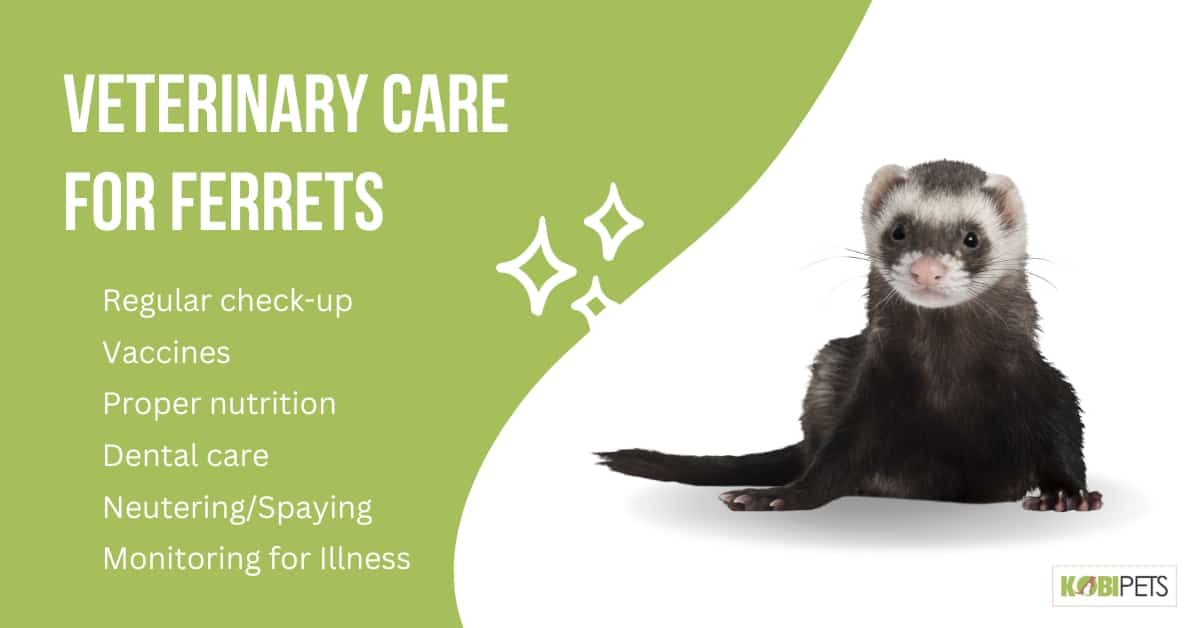
Veterinary Care for Ferrets
Grooming Requirements for Ferrets
Ferrets are naturally clean animals, but regular grooming is still important for their health and well-being. Here are some tips on what to consider when grooming your ferret:
Brush fur regularly – Brushing helps remove any dirt and debris from their fur, as well as prevent hairballs.
Clean ears and eyes – Use a soft cotton cloth to wipe away any buildup around their ears or eyes.
Check teeth – An annual checkup with the vet is recommended; they can detect any early signs of dental disease.
Trim nails – Regularly trimming your ferret’s nails helps keep them at a comfortable length.
Bathe occasionally – Ferrets rarely need baths, but if your pet gets particularly dirty you can bathe them using cat-safe shampoos.
Keep bedding clean – Change or wash bedding regularly to ensure that your ferret stays healthy and free from infection or parasites.
Being proactive about grooming your ferret will not only help maintain their hygiene but also develop a stronger bond between owner and pet!
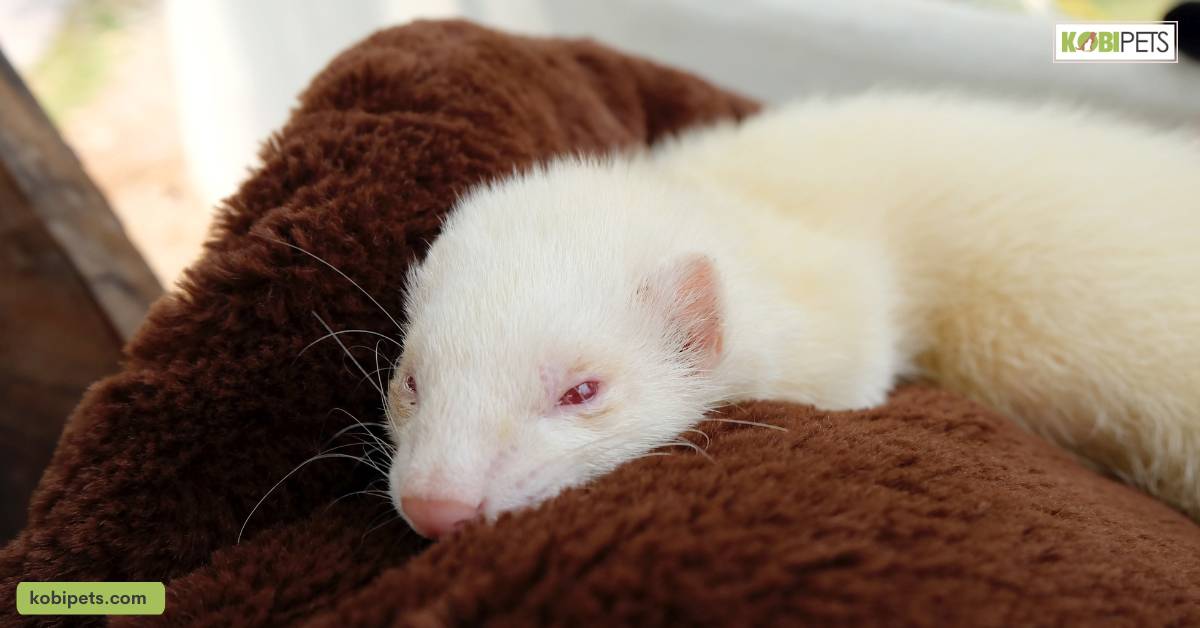
General Health Tips for Ferret Owners
Owning a ferret is a rewarding experience, but it does take some work. Fortunately, with the right knowledge and preparation, you can ensure your ferret is healthy and happy.
Here are some general health tips for ferret owners to keep in mind:
- Take your pet to the vet regularly – health checkups are important to catch any medical issues early on.
- Feed them properly – make sure your ferret always has access to fresh water, high-quality ferret food, and occasional treats like fresh fruits or vegetables. Avoid sugary or artificial sweeteners.
- Clean their cage regularly – remove waste and debris from their living space as needed and make sure everything is properly sanitized.
- Provide plenty of exercises – create an environment where they can explore and play around safely, such as in a large open space or with tunnels set up for them.
- Keep them mentally stimulated – give them chew toys or other objects that can help keep their minds active. Puzzle feeders are also great for this!
- Nail trims – trim your ferret’s nails at least once a month so they don’t accidentally scratch themselves while playing or exploring.
- With a little bit of care and dedication, you can be sure that your furry friend will be healthy and safe throughout their life!

In Conclusion
Owning a ferret is a great responsibility that you must take seriously. They require special dietary and exercise needs, regular check-ups, vaccinations, dental care, grooming, and more. By ensuring your ferret receives the proper healthcare they need, you can help them lead a happy and healthy life for many years to come!






